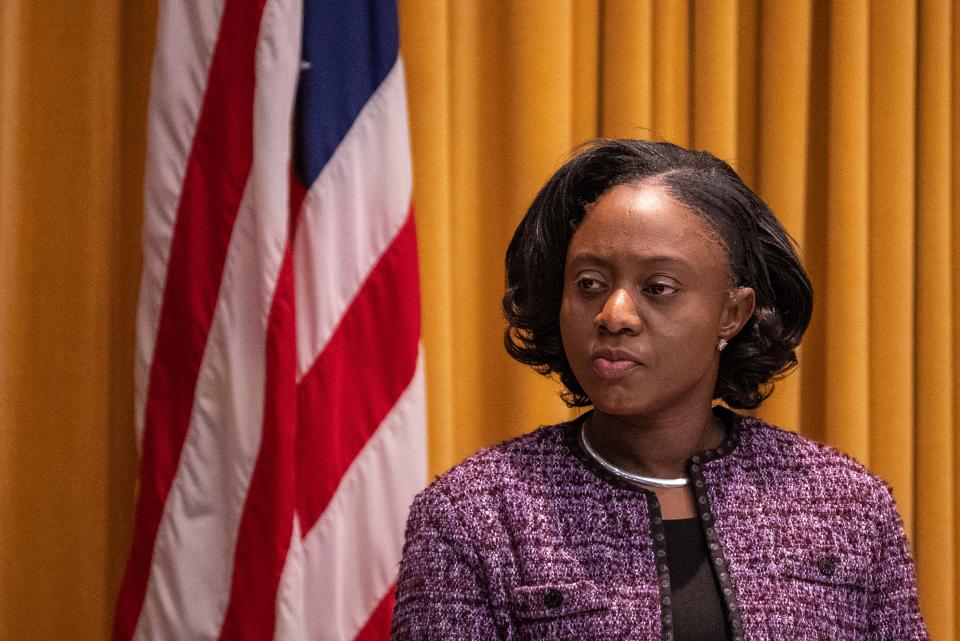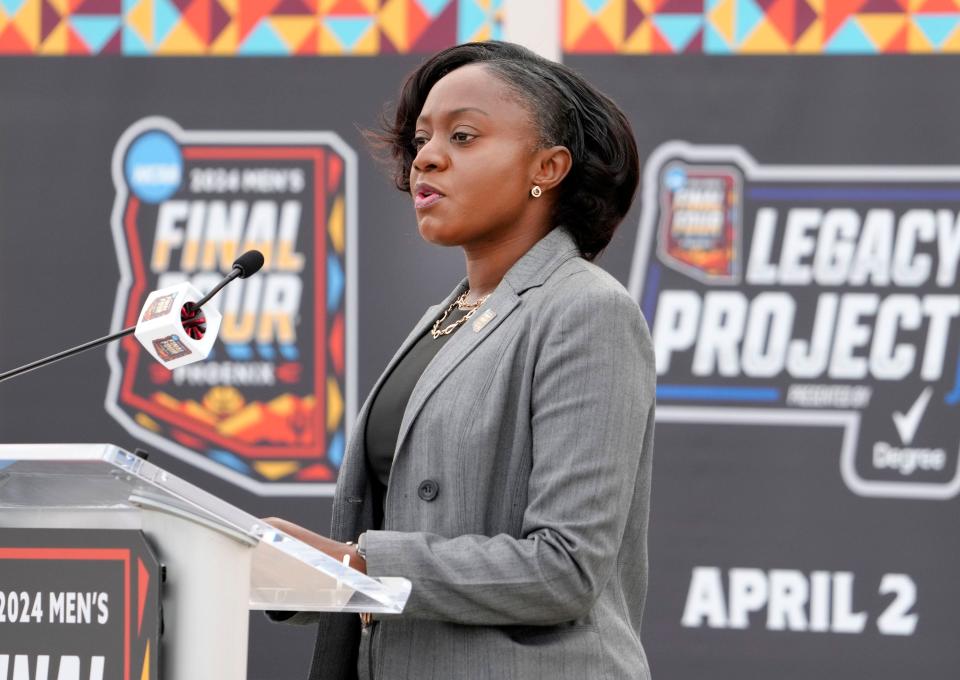Phoenix councilmember's effort to alter Civilian Review Board rules may violate state law
Corrections & Clarifications: Danee Garone's last name was misspelled in a previous version of the article.
A Phoenix City Council member discussed making changes to police oversight board rules with a majority of councilmembers during one-on-one conversations outside of a public meeting, in potential violation of Arizona's Open Meeting Law.
Councilwoman Kesha Hodge Washington spoke individually with Vice Mayor Debra Stark and Councilmembers Jim Waring, Betty Guardado, Kevin Robinson and Carlos Galindo-Elvira about changes she eventually would ask the City Council to approve related to qualifications and conduct for Civilian Review Board members. The board is tasked with reviewing Phoenix Police Department investigations related to use of force.
Hodge Washington drafted a proposal, met with individual council members to discuss it, then submitted a final, altered proposal to the city clerk. The City Council was slated to vote on her proposal May 15.
State law mandates that discussions among a majority of City Council members about collective actions should be deliberated publicly in an open meeting. This rule applies whether the majority met in person, virtually or communicate through email. It also applies whether they met all at once, or if one person met with the majority in one-on-ones.
The idea is that the public should be able to hear how their elected leaders are deliberating and deciding issues. The state attorney general's handbook on Open Meeting Law says public officials should "refrain from ... actions that may appear to remove discussions and decisions from public view."
Danee Garone, a senior staff attorney at the Arizona Ombudsman's office, said if a council member "is pitching a particular change to the ordinance, I think there is a solid argument they are violating the open meeting law."
There could be more leeway, Garone said, if the conversation was "simply gauging interest in potentially amending the ordinance in some to-be-decided way."
Attorney Tim LaSota had a similar reaction: A council member can have general conversations, even with a quorum, but that conversation can't include details and a decision cannot be made.
A slideshow explainer of Open Meeting Law on the city's website states that polling other members for opinions on issues is banned, as is "communication among members of the Body on current or potential action items" and "separate or serial discussions with a majority of the members of the body on a potential action item."

Why Hodge Washington says she shared her proposal
Hodge Washington told The Arizona Republic she shared her proposal with council members to provide clarity and explain her rationale for why she wanted the council to reconsider the ordinance.
The City Council codified the Civilian Review Board in a controversial vote earlier this month. The vote included last-minute changes to rules about who qualified to serve on the board — rules which four councilmembers, including Hodge Washington, believed lacked public input.
The councilwoman said at the meeting she would file a request to force the City Council to reconsider the rules, which then led to her draft proposal and conversations with council peers.
Catch up: Phoenix to vote on eligibility change for police Civilian Review Board
Hodge Washington said she does not believe she violated Open Meeting Law because she "limited" her conversations and viewed them as no different than staff briefing individual council members. City staff regularly brief individual council members and their staffs on items scheduled for votes.
Hodge Washington added that she was not trying to secure a particular outcome and does not know how her council peers will vote on her proposal May 15.
She added that she did not want her reconsideration request to be futile. If she did something wrong, she said, it was not her intent.
But a review of Hodge Washington's final proposal compared with her initial draft, obtained by The Republic, shows multiple adjustments were made, and at least one change aligned with feedback she received.

She initially proposed narrowing the ban on individuals who've filed a claim or litigation against Phoenix police from serving on the board to five years. Stark told The Republic she asked Hodge Washington to consider 10 years. The final proposal suggested 10.
In the initial draft, Hodge Washington proposed allowing former police officers who worked outside of Arizona to serve on the board and restricting eligibility to residents of Phoenix, as opposed to those who work or reside in Phoenix. Those changes didn't make the final draft.
Did council members think of the Open Meeting Law?
None of the council members who answered questions from The Republic said they were concerned about Open Meeting Law violations.
Stark told The Republic she did not believe any Open Meeting Law violation occurred because the proposal wasn't on the agenda at the time.
Guardado said the conversation was about a topic that already had been publicly discussed, and that nothing had been decided.
Galindo-Elvira also said he wasn't asked to make a decision and didn't make a decision.
Waring and Robinson said they hadn't spoken to a quorum and didn't ask or know who else Hodge Washington was speaking to.
If Hodge Washington's conversations violated state law, it's unclear whether solely Hodge Washington or all the council members would be in violation.
"It might be that all members who realize that the conversation will be shared amongst a quorum and still participate are violating the Open Meeting Law," said Garone, from the Ombudsman's office.
He added, "Whether an issue is or has been on a meeting agenda is irrelevant in determining whether private discussions constitute Open Meeting Law violations."
Accusations of Open Meeting Law violations are investigated by the state attorney general and county attorneys. Penalties for violating Open Meeting Law include civil fines: $500 for a second violation and up to $2,500 for two or more violations. Other remedies sometimes include additional training for public officials.
Mayor Kate Gallego and Councilmembers Ann O'Brien and Laura Pastor did not respond to interview requests and written questions. O'Brien's chief of staff said O'Brien did not receive any written drafts from Hodge Washington.
Taylor Seely covers Phoenix for The Arizona Republic / azcentral.com. Reach her at tseely@arizonarepublic.com or by phone at 480-476-6116.
This article originally appeared on Arizona Republic: Phoenix councilmember's effort to alter Civilian Review Board rules may violate state law

